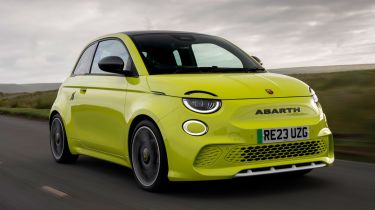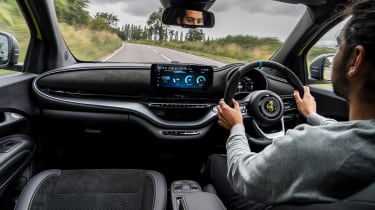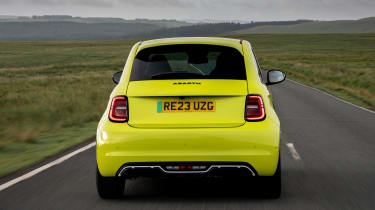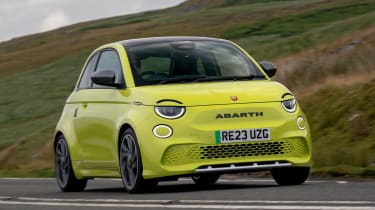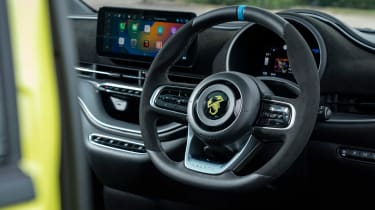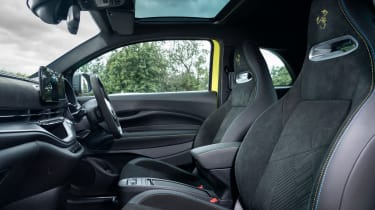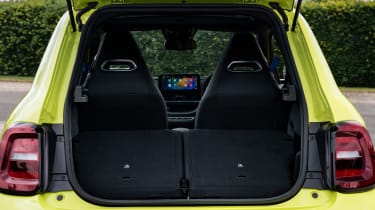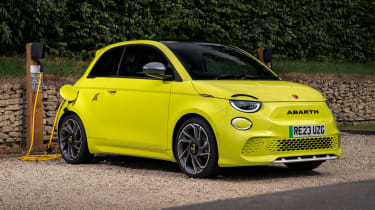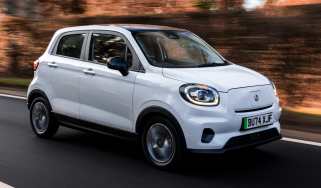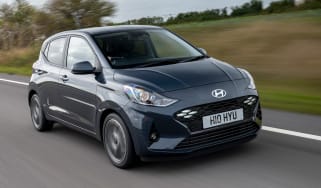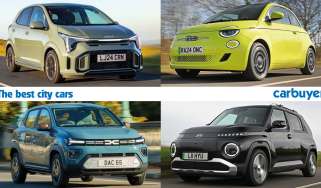Abarth 500e review - the most fun small EV?
“The Abarth 500e is a feisty electric city car with go-faster add-ons and even a synthesised engine sound to stir the emotions”
Pros
- Fun character
- Peppy performance
- Well equipped
Cons
- Tiny boot
- Cramped rear seats
- Boomy sound generator
Verdict - Is the Abarth 500e a good car?
While there have been a few quick electric hot hatchbacks, the Abarth 500e is the most overtly sporty small EV so far – it even has a speaker dedicated to making a rorty faux-exhaust noise on the move. It’s a thorough transformation from the Fiat 500, both inside and out, that’s sure to tempt some buyers away from rivals like the MINI Electric. Beware, however, as flagship versions can top £40,000 – a big premium over more powerful and more practical rivals.
Abarth 500e models, specs and alternatives
Abarth found great success in the UK with its petrol-powered city car, based on the Fiat 500. Buyers loved its retro charm, rorty soundtrack and peppy performance, along with its affordable pricing and leasing deals. It’s no surprise then, that the Abarth 500e follows hot on the heels of the latest electric Fiat 500, but will loyal hot hatch fans want to make the switch to electric?
They might if they want one of the first small electric hot hatches, because while some are already quite nippy, none are as overtly sporting as the Abarth. Its closest rival already on sale is the MINI Electric (due for replacement in 2024). The MG4 XPower is much larger and even quicker, but its price puts it in the same ballpark as the 500e – however, while the Abarth shouts about its hot-hatch credentials, the MG4 XPower is a little too ordinary-looking to turn heads. For those who aren’t convinced by the prospect of regularly plugging in, the petrol Abarth 695 will remain on sale for now.
The Abarth 500e can be had in standard and Turismo trim and in both hatchback and convertible form, the latter with a canvas roof. Standard kit includes 17-inch alloy wheels and sports seats, along with a 10.25-inch infotainment screen and an Abarth Sound Generator that can mimic the noise made by the petrol Abarth 695. Turismo versions get 18-inch alloys and Alcantara upholstery, along with niceties like heated seats and a panoramic sunroof.
Power is provided by a single electric motor, sending 152bhp and 235Nm of torque to the front wheels. It’s enough to get the electric pocket rocket from 0-62mph in seven seconds, and it feels especially rampant around town. Hit the throttle at 25mph and it will whizz up to 37mph in 1.5 seconds, shaving a whole second off the old petrol Abarth’s time. While that might sound like a bit of an odd metric, it’s the sort of punch that should make nipping into gaps and passing slower traffic a doddle.
Firm suspension, weighty steering and a longer and wider chassis mean the 500e inspires greater confidence than the petrol 695. We’ve now driven the car both in Italy and here in the UK – in various weather conditions and on a variety of roads. It’s an alert little pocket rocket, and one that felt keen to attack corners.
The Abarth Sound Generator will also give it a unique selling point for the time being – it’s a waterproof external speaker designed to mimic the sound of a petrol car, that’s surprisingly loud both inside and outside the car. We don’t disagree with the concept of augmenting an EVs soundtrack, and it works pretty well at lower speeds, but more control over its volume at a steady cruise would be appreciated to stop it getting tiresome. We’re assured a fix is in the works.
|
Trim levels |
Power options |
|
|
Abarth 500e alternatives
While the Abarth 500e can lay a claim to being one of the first proper small electric hot hatchbacks, it isn’t entirely without competition. The MINI Electric is arguably its closest rival, but there are also some other small EVs with punchy motors, even if they aren’t marketed as being as overtly sporting as the Abarth. The MG4 XPower is a larger proposition, but its affordable pricetag means you might consider it over a 500e, though it looks more unassuming than the Abarth.
Electric superminis
MPG, running costs & CO2 emissions
While it might be a sporty Abarth, the 500e still reaps all the benefits of being a fully-electric model, including zero emissions. This is likely to make it a popular choice with business choosers, especially those with city-based commutes, thanks to the low cost of Benefit-in-Kind (BiK) for EVs. VED (road tax) will also be completely free until the rules change in 2025.
Sharing the same 42kWh battery as the Fiat 500, the 500e won’t cover the same sort of distance between each charge as a Tesla Model 3, and its 164-mile official range (for the entry version on the smaller wheels, we might add) is also quite a bit down on the 199-mile figure for the Fiat 500. It’s competitive against the outgoing MINI Electric’s 145-mile range, but there’s an all-new version of that car on its way which should be able to get closer to 250 miles. The Abarth 500e’s lack of a heat pump to keep the battery at optimum operating temperature also means its driving range is negatively affected in colder weather.
Still, it’s worth remembering the Abarth 500e is a city car, and unlike petrol models, the range of an EV tends to increase when driven in stop and start traffic, so a smaller range isn’t necessarily a big problem. If you do need to take longer trips from time to time, there’s 85kW fast charging; enough to take the battery from 10-80% in 25 minutes.
|
Model |
Battery size |
Range |
|
Abarth 500e |
42kWh |
164 miles |
Insurance
Insurance groups have recently been confirmed for the Abarth 500e, and they’re actually quite a bit lower than we expected. All versions sit in group 23 (out of 50), which should make annual premiums relatively affordable for an EV. For reference, that’s the same rating as a top-spec MINI Electric, while the standard Fiat 500 La Prima sits in group 18.
Engines, drive & performance
Abarth models are designed to feel exuberant, and there’s no doubting that the 500e feels alert as soon as you get going. One of the key benefits of an electric motor is the lack of lag, so there’s no hesitation when you tap into the Abarth’s instant torque.
Its steering has been altered to feel much more weighty – particularly in the Abarth’s racier driving modes – than the Fiat 500’s, and this coupled with the Alcantara trimmed wheel is a highlight of the driving experience. The fact the new model is longer and wider than the Abarth 695 means it also feels more stable on the road and track.
We came away from our drive in the Abarth 500e impressed by its overall performance and composure. Cars like the 500e can often feel a bit bouncy due to their stubby overall length, but the Abarth manages to feel playful without suffering a particularly unruly ride. The steering has been reworked compared with the standard Fiat 500, and feels satisfyingly heavier as a result.
Its suspension is reasonably stiff, but the 500 no longer crashes into potholes in the same abrupt manner as its petrol predecessor. There is lots of front-end grip, and while the car does feel inherently safe most of the time, we never thought it boring; the 500e is more engaging than almost all of its rivals, and feels far closer in spirit to models like the MINI Electric than before.
The standard Fiat 500’s electric motor has been boosted from 116bhp to 152bhp in the Abarth, and given a more aggressive throttle response. It has made it a second quicker from 25-37mph than the petrol Abarth 695, showing off how much mid-speed punch it has for nipping into gaps and passing slower traffic. However, this pace tails off slightly at higher speeds, which no doubt explains why it’s still around half-a-second slower than the 695 from 0-62mph. Overall, though, the Abarth 500e feels just about fast enough for a nippy hot hatch.
There are three driving modes called Turismo, Scorpion Street and Scorpion Track, with the first limiting power and serving up more regenerative braking for one-pedal driving around town. Scorpion Street keeps the regen but adds full power, while the Track version reduces the braking effect of the electric motor. The regenerative braking won’t be to every driver’s taste, although the standard friction braking is strong and the transition between e-moto and friction deceleration is very smooth.
When you do want to drive it in a more civilised fashion, the 500e offers smooth power delivery thanks to the Turismo mode’s delayed throttle response, so despite its sporting credentials, it can still be easy to live with.
Unlike any other EV hot hatch launched so far, the Abarth 500e also features the Abarth Sound Generator – a speaker setup that aims to recreate the noise of a petrol car, with more than 6,000 hours of research to perfect it. The waterproof speaker is audible inside and outside the car, with a burble that matches your throttle inputs. While it’s a fun idea on paper, the artificial sound can get annoying after a while, and doesn’t sound particularly convincing with its lack of gearchanges, plus it delivers an irritating drone while cruising at 50mph, We also wish it was easily adjustable on the move, but the option to turn it off is accessed via a set of illogical submenus through the driver’s display only.
For those reasons, you’ll want to make sure you turn off the sound generator if you take the Abarth 500e onto the motorway, where it can be particularly annoying to listen to. Though the Convertible version’s roof is well insulated, wind noise is naturally worse on this model, but in all truth, both versions are only really suitable for driving around town.
|
Model |
Power |
0-62mph |
Top speed |
|
Abarth 500e |
152bhp |
7.0s |
96mph |
Interior & comfort
Hop in the Abarth 500e after its Fiat 500 cousin, and there are plenty of changes to ensure you know it’s the more sporting and exotic car. Sports seats with integrated headrests add to the motorsport feel, but while they offer lots of support around the shoulders, we wish they were a little more adjustable lower down. Alcantara trim and Acid-Green Scorpion logos in the Turismo version help the 500e stand out. The Cabrio version is also worth considering for open-air motoring, thanks to its canvas roof which slides back to open the top without affecting the doors or side windows. It’s worth noting that ticking this box does add an extra £3,000 to the price.
The door releases on the 500e are electric, just like in a Tesla – it almost feels like an unnecessary addition, however, when features like these need to be backed up by mechanical failsafe handles. Still, while many manufacturers forego physical controls, it’s good to see the Abarth retains big roller switches on the centre console for the drive-mode selector and volume control.
Infotainment and navigation
Every Abarth 500e gets a 10.25-inch infotainment touchscreen which can display ‘Performance Pages’, providing data akin to the sort of information displayed in a computer racing game. It’s also equipped with Apple CarPlay and Android Auto as standard, and there’s a seven-inch digital instrument display with Abarth graphics.
The sat nav comes with some very EV-friendly features, such as a dynamic range-mapping system which can find electric charging stations within reach and adapt the route to pass through these, making sure you don’t run the battery flat.
It’s a good, responsive system overall, although we did find some menus a bit confusing to navigate. The same is true of the digital instrument cluster, which you’ll need to use if you want to switch the Abarth Sound Generator on or off. It’s probably a good thing you can only do this when the car is stationary – we certainly wouldn’t want to be flicking through countless sub-menus at motorway speeds.
There are two specs simply called 500e and Turismo. The standard car comes with essentials like 17-inch alloy wheels, auto LED headlights, the infotainment screen and climate control, rear parking sensors, cruise control, lane keep assist, along with keyless go for around £3,000 more than the Fiat 500.
Turismo is likely the one most buyers will go for, because it adds quite a lot of desirable kit, especially if the leasing monthly amount isn’t significantly more. There’s grippy Alcantara trim inside, a panoramic roof, wireless phone charging and 18-inch alloy wheels, as well as driver convenience tech like blind-spot detection.
Key features | |
|
500e
|
Turismo (500e plus…)
|
Practicality & boot space
Practicality was never going to be the Abarth’s strong point, and it shouldn’t be considered too much more useful than a 2+2 sports car for carrying people and luggage. The front seats feel spacious, light and airy of course, but there’s only room for small adults, small children and soft bags in the rear seats, which have to be clambered into because of the lack of rear doors.
It’s also worth noting that there’s no frunk or dedicated cable storage space, so unless you’re happy to leave these at home, they will probably need to take up boot space in a carry bag.
|
Size comparison | |||
|
Model |
Length |
Width |
Height |
|
Abarth 500e |
3,631mm |
1,683mm |
1,518mm |
|
MINI Electric |
3,850mm |
1,727mm |
1,432mm |
|
Honda e |
3,894mm |
1,752mm |
1,512mm |
|
Peugeot e-208 |
4,055mm |
1,765mm |
1,430mm |
Boot space
The boot measures just 185 litres in capacity, which is slightly larger than the 171-litre boot of the Honda e, but is actually beaten by the MINI Electric’s 211-litre boot space. Go for the Convertible model and this drops to just 155 litres. If you want a sporty EV with room for back-seat passengers and their luggage, the Cupra Born is a better option. The MG4 XPower is much bigger, too.
|
Boot space comparison | |
|
Model |
Boot space |
|
Abarth 500e |
185 litres |
|
MINI Electric |
211 litres |
|
Honda e |
171 litres |
|
Peugeot e-208 |
311 litres |
Reliability & safety
While Abarth didn’t appear in our latest Driver Power survey, Fiat came 31st out of 32 manufacturers – with only MG finishing lower in the overall rankings.
Perhaps most surprising was that only 12% of Fiat owners reported a fault within the first year – beaten only by Suzuki (8%) in this respect. Fiat customers complain about practicality, a lack of safety features and poor interior quality. While the Abarth 500e certainly falls foul of a lack of space, its cabin and associated infotainment should impress buyers.
Safety
Again we’ll need to defer to Fiat 500 data here, because the Abarth hasn't yet been subjected to Euro NCAP's crash tests. The Fiat scored a respectable four stars when it was assessed in 2021, which is roughly on par with a number of the car's key rivals. It’s not yet clear whether the Abarth 500e will simply adopt this rating, or be deemed too different – thus requiring a test score of its own.
